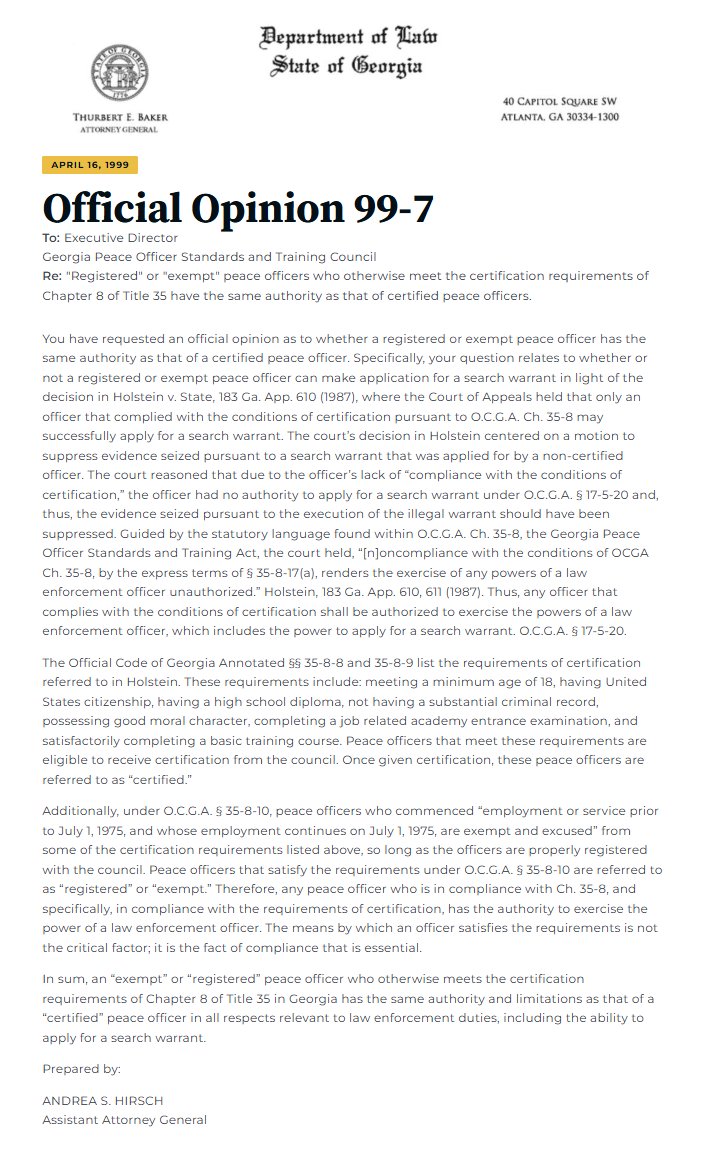Talbot County Arrest Controversy: No POST Registration, No Arrest Powers
In a case that could unravel an entire prosecution, evidence now shows that a Talbot County arrest carried out on May 8, 2025, may have been illegal under Georgia law—because the arresting officer was not authorized to arrest anyone at the time.

All files submitted to the District Attorney are at the bottom of this story.
According to official Georgia POST Council records, Investigator Richard C. Ousley had no valid POST-registered employment with the Talbot County Sheriff’s Office on the date of the arrest. His last recorded POST employment was with Pine Mountain Police Department, and no C-11 employment change form placing him in Talbot County was submitted until June 5, 2025—nearly a month late.
Despite this, Ousley executed a criminal arrest warrant issued by Talbot County Magistrate Judge Shatara Powell. The warrant was addressed to “any sheriff, deputy sheriff, or other peace officer of this state.”
The legal problem: A POST-deficient officer is not a peace officer under Georgia law, and therefore cannot execute a judicial arrest warrant.
Applicable Law
- O.C.G.A. § 35-8-15 — Agencies must file employment records for every peace officer with POST.
- O.C.G.A. § 35-8-17(a) — A POST-noncompliant officer “shall not be authorized to exercise the powers of a law enforcement officer… [including] the power of arrest.”
- O.C.G.A. §§ 17-4-20 & 17-4-40 — Arrest warrants are executable only by peace officers.
- O.C.G.A. § 17-4-80 (formerly § 17-4-60) — Citizens’ arrests allowed only in limited scenarios.
Case Law Support
- Mason v. State — POST-noncompliant officers are private citizens, limited to citizen’s arrest powers.
- Williams v. State — Citizen’s arrest power only applies to offenses committed in one’s presence or immediate knowledge.
- Holstein v. State — POST-deficient officer cannot apply for or execute warrants.
- State v. Harber — “Officer of this state” means POST-certified and authorized to enforce laws.
Why This Arrest Was Illegal
Ousley was POST-deficient at the time. That made him, in the eyes of Georgia law, a private citizen.
- Private citizens cannot execute judicial arrest warrants.
- The alleged offense did not occur in Ousley’s presence, meaning it wasn’t a lawful citizen’s arrest.
- The warrant execution was therefore unauthorized and ultra vires.
Because the arrest was unlawful, all resulting evidence—including statements, seized items, and derivative material—is subject to suppression under the Fourth and Fourteenth Amendments.
Prosecutor’s Position
Despite being informed of this legal defect, ADA William Hocutt has stated he intends to present the case to a Grand Jury on November 10, 2025 once he receives the file from the Sheriff’s Office.
First Amendment Concerns
The arrestee is a local journalist known for filing open records requests and publicly questioning the Talbot County Board of Education’s finances. If the arrest was in retaliation for protected speech, it could constitute a civil rights violation under 42 U.S.C. § 1983.
📊 Fact Sheet
|
Category |
Details |
|
Date of Arrest |
May 8, 2025 |
|
Arresting Officer |
Investigator Richard Ousley — No POST-registered employment with Talbot County; C-11 filed June 5, 2025 |
|
Georgia Law |
O.C.G.A. § 35-8-17(a): No POST compliance = no arrest powers; O.C.G.A. § 35-8-15: Records must be filed |
|
Legal Precedent |
Mason v. State: POST-deficient officers = private citizens; warrants must be executed by peace officers |
|
Prosecutor’s Position |
ADA Hocutt anticipates Nov. 10 Grand Jury presentment |
|
First Amendment Concerns |
Arrest targeted journalist for public speech and open records requests |
|
Public Trust Issues |
Sheriff Gates, Ousley, and Sanders already sued for civil rights violations; Sheriff’s Office budget controversy |
|
Bottom Line |
No POST registration = No arrest authority; case may collapse in court |
📄 Download the One-Page Fact Sheet PDF
The Bigger Picture
This incident comes amid growing scrutiny of the Talbot County Sheriff’s Office. Sheriff Bobby Gates and his senior staff are already defendants in an ongoing civil rights lawsuit, and the office is facing public outrage over a proposed $4.4 million budget—a 150% increase.
If the courts find that the May 8 arrest was unlawful, it will not only undermine this prosecution, but also raise serious questions about systemic disregard for Georgia’s POST laws and the constitutional rights of Talbot County citizens.
Talbot County Arrest Controversy — Key Facts
🗓 Date of Arrest in Question:
- May 8, 2025
🚔 Arresting Officer:
- Investigator Richard Ousley
- No POST-registered employment with Talbot County Sheriff’s Office on this date
- Last POST record: Pine Mountain Police Department
- C-11 employment change form filed June 5, 2025 — nearly a month late
📜 Georgia Law:
- O.C.G.A. § 35-8-17(a) — Officer without current POST compliance is not authorized to exercise arrest powers
- Arrests made without POST compliance are void under law
- O.C.G.A. § 35-8-15 — Agency must promptly file employment records with POST
⚖️ Legal Precedent:
- Mason v. State and similar rulings: An officer lacking statutory authority cannot lawfully arrest anyone
- Evidence obtained in such arrests can be suppressed in court
📧 Prosecutor’s Position:
- ADA William Hocutt plans to present the case to the Grand Jury on November 10, 2025
- This is despite being informed that Ousley had no arrest authority on the date in question
📰 First Amendment Concerns:
- Arrest targeted a local journalist
- Related to open records requests and public comment on school district finances
- Raises possible civil rights violation under 42 U.S.C. § 1983
📉 Public Trust Issues:
- Sheriff Bobby Gates, Ousley, and Deputy Chief Mamie Sanders are already defendants in an ongoing civil rights lawsuit
- Sheriff’s Office recently under fire for proposed $4.4 million budget — a 150% increase
🔍 Bottom Line:
- No POST registration = No legal arrest powers
- Any prosecution based on such an arrest could be thrown out
Raises serious concerns about accountability in Talbot County law enforcement and prosecution.

Files
Share
What's Your Reaction?
 Like
2
Like
2
 Dislike
1
Dislike
1
 Love
0
Love
0
 Funny
0
Funny
0
 Angry
2
Angry
2
 Sad
1
Sad
1
 Wow
1
Wow
1











